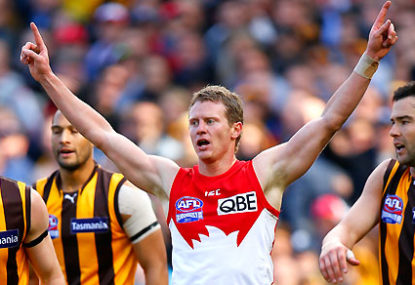Expert

Uneasy lies the head that wears the crown.Another season has come to pass. Another football year is over. And another premiership cup has been delivered to the best team in September, not necessarily the best team of the year.
The pressure that accompanies expectation is not easily handled and, like in many elite sports, the burden of favouritism has proven too heavy for many a team to bear when it comes to the AFL grand final.
In the last 23 years, since the VFL became the AFL, only 30% of teams finishing on top of the ladder have gone on to claim the flag, and the Hawthorn class of 2012 becomes the latest side to fall victim to this statistical peculiarity.
Another recent trend to emerge in grand finals is wasteful efforts in front of goal after early match dominance costing victory in tight games. Often the perpetrator is the more favoured team.
‘Bad kicking is bad football’ is a saying as old as the game itself, and never is it truer than in the final match of the year.
Including the drawn grand final between Collingwood and St Kilda, the team with more scoring shots has won only four of the last nine grand finals.
The Hawks should have been one or two more goals to the good at quarter time on Saturday, but their profligacy in front of goal, mainly through nervous and tentative kicking, ensured that they weren’t.
When they didn’t match Sydney’s ferocity, dedication and discipline in the second quarter, the Swans were able to exact full toll, kicking six straight goals for the term in what was ultimately the defining period of the match.
While the Hawthorn players were hard at the ball and man for the majority of the game, they could do worse than watch a video of Daniel Hanneberry’s grand final. The 21 year old eats bricks for breakfast, and plays accordingly. He never hesitated before fully committing his body to a dangerous situation again and again through the match. I’m not convinced all Hawks players can say the same.
We’ve all hailed the structure of the Sydney defence throughout 2012, and it was evident again on the biggest stage. In the second quarter, Hawthorn’s was ragged, easily penetrated. Time and again, the Swans players running forward were being trailed by their Hawk opponent.
Getting goal-side, effectively putting your body between your opponent and the goals, is the most basic rule of defending, and the Hawthorn midfielders and backmen weren’t willing to push hard enough for long enough to attain this position consistently.
It will haunt each and every one of them. All will have the little devil inside them asking if they really did enough.
Able to finish on top with arguably the hardest draw of the year, Hawthorn can be comfortably called the best team for 2012. The pain of a grand final loss will only be accentuated by this fact.
Sydney maintained a consistently high level for the entire season, gradually earning the mantle of the second best side as other supposed contenders like West Coast, Carlton, Geelong and Collingwood dropped away for various reasons. The likes of Adelaide, Fremantle and North were never going to be good enough, but all are on the right track in the long term.
As the Hawks found out to their chagrin, the Swans don’t drop away. In fact, they’re relentless in pursuit of victory.
Hawthorn were always in control against an ailing Collingwood in the first week of finals, but the mistakes of the preliminary final against Adelaide were to the fore again. Those who do not learn from history are doomed to repeat it.
Sydney were never seriously threatened in either of their finals in the lead up to the big one and, despite being outplayed for long periods on Saturday, were worthy victors.
It was instructive that the Swans three best players in the match are about five years of age apart. Ryan O’Keefe, Jarrad McVeigh and Hanneberry represent three mini-generations of footballer within the club. Note that the gap between their best and worst is small.
Watch any of them for five minutes on the field and listen to them for a couple off it, and it’s clear that the famous ‘Bloods’ culture is in good hands.
Coaches will always tell us that their team is a work in progress, that all they want to do is improve. Sydney certainly did throughout the year, so it wasn’t just cliché when spoken by John Longmire.
No doubt every club would like to peak in September, but you need to get there first. Perhaps the trick is to not be the best when you do.